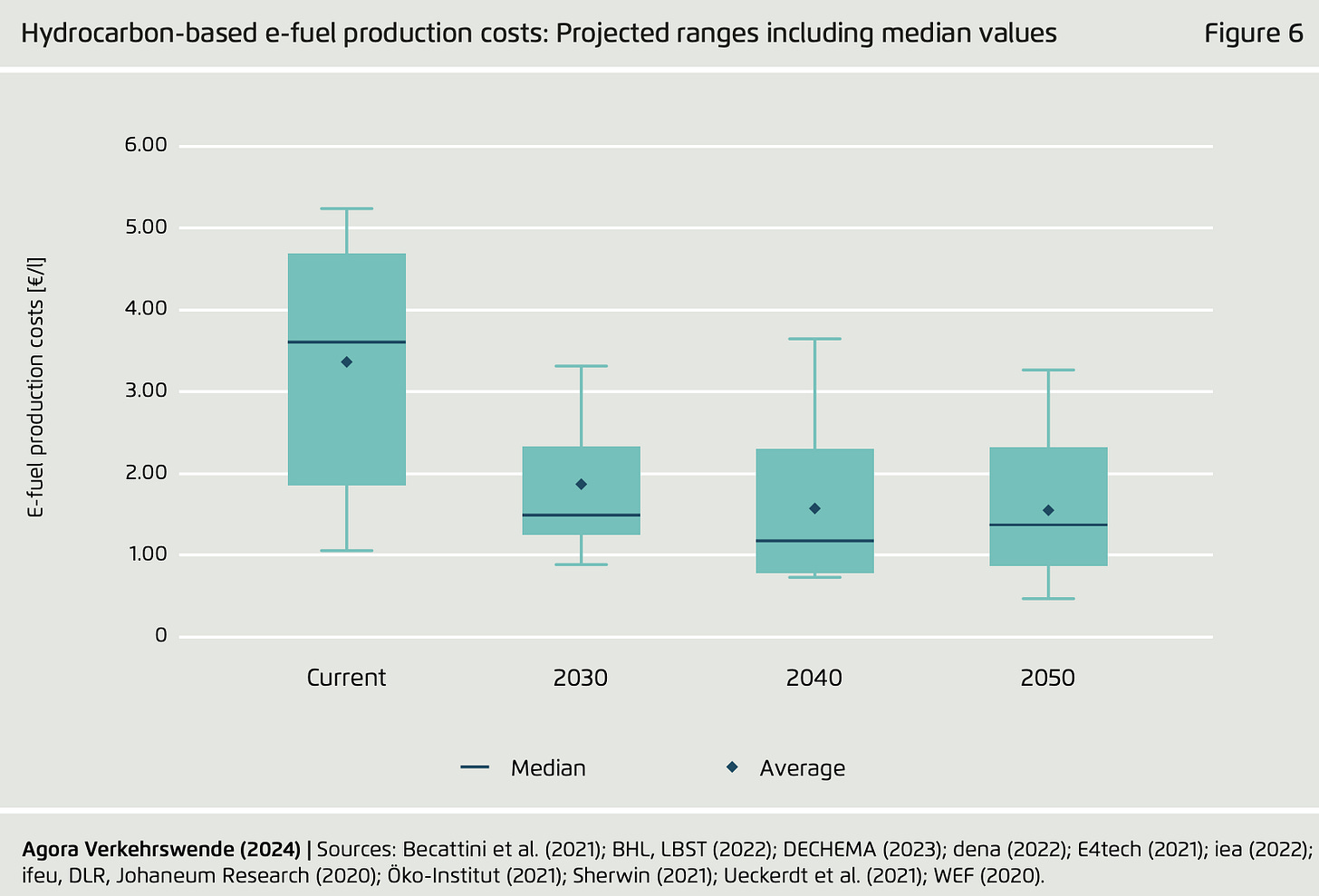Global Climate News: June 22-25
Denmark's carbon tax on rearing livestock; New Zealand's 2nd ETS auction; Germany's Circular Economy Strategy; Canada's Investment Tax Credit for Carbon Capture, Utilisation and Storage;
In this newsletter
Clean Energy Economics - Synthetic Fuels
News from Governments
Carbon Markets, Carbon Capture and Storage
Top stories
Clean Energy Economics - Synthetic Fuels
Agora Verkerswende has estimated the cost of producing synthetic fuels based on different studies using the Fischer-Tropsch synthesis method (the only certified pathway for sustainable aviation fuel (SAF) production currently). The current average is €3.85/ litre (~$4.12/litre), with a range between €2.05-4.70/ litre.
Electricity accounts for 28-49% of the production cost. Here are ranges for current and projected costs by 2030, 2040 and 2050.

Euractiv | Agora Verkehrswende - E-fuels: Separating the substance from the hype, May 2024 (PDF)

News from Governments
Australia has set a national target to protect and conserve 30% of its land and marine areas each by 2030. A draft roadmap for this suggests
expanding public and private protected areas
establishing new national parks
implementing a Nature Repair Market to enable investment, and biodiversity certificates for eligible activities
funding for private landowners to implement conservation schemes
tax concessions for conservation on private land
increasing the number of Indigenous Rangers
Government Press Release | Carbon Pulse | Draft National Roadmap for protecting and conserving 30% of Australia’s land by 2030 (PDF)
Germany has published a draft National Circular Economy Strategy
The strategy's targets include reducing the annual per capita consumption of raw materials from 15 tonnes today to 8 tonnes by 2045; doubling the share of circular materials used from 2021 to 2030 in line with EU targets; supporting the targets from the EU's Critical Raw Materials Act, such as meeting 10 percent of strategic resource demand through domestic production; and reducing per capita waste 10 percent by 2030 and 20 percent by 2045. Clean Energy Wire
Carbon Markets, Carbon Capture & Storage
Denmark will begin collecting a carbon tax for rearing livestock from 2030. Farmers will be taxed 300 kroner ($43) per tonne of CO2 emissions emitted by cows, sheep and pigs. Income tax benefits will reduce the effective tax to about 120 kroner ($17) per tonne. The move is pending approval in the Danish parliament. APNews | Government Press Release in Danish
New Zealand’s second ETS (Emissions Trading Scheme) auction, held on June 19, failed to clear as the prices in the secondary market have been below the auction price floor of NZ$64 ($39). The first auction, held in March this year, cleared only partially at the price of NZ$64. Argus | June 2024 Auction Results | March 2024 Auction Results
Canada has published guidance on its Investment Tax Credit for Carbon Capture, Utilisation and Storage (CCUS).
The CCUS ITC is a refundable tax credit that applies to eligible expenditures incurred for a qualified CCUS project, from January 1, 2022, to December 31, 2040. This ITC is related to the acquisition of property used to capture CO2 emissions from fuel combustion, industrial process or directly from the air, to transport the captured carbon and to store it or use it in industry.
This ITC is available for CCUS projects to the extent that 10% or more of the captured CO2 is used in an eligible use.
Eligible uses include geological storage, or carbon sequestration via a qualified process.
CCUS Investment Tax Credit - Technical Guidance Document, June 2024 (PDF)
France is planning a CO2 pipeline from its Dunkirk industrial area, home to several cement and steel manufacturers, to an undersea storage site off the coast of Norway. Equinor Press Release
The state of Iowa (USA) has approved a CO2 pipeline to transport liquefied CO2 captured at ethanol plants in 5 states (Iowa, Minnesota, Nebraska, North Dakota and South Dakota) to an underground storage location in North Dakota. Approvals from other states are still pending. APNews
German airline, Lufthansa, will begin collecting a Environmental Cost Surcharge of upto €72 per ticket for tickets booked June 26, 2004 onwards for departures from January 1, 2025 for all flights departing from the 27 EU countries, plus the UK, Norway and Switzerland.
The surcharge is intended to cover part of the steadily rising additional costs due to regulatory environmental requirements. These include the statutory blending quota of initially two percent for Sustainable Aviation Fuel (SAF) for departures from European Union (EU) countries from January 1, 2025, adjustments to the EU Emissions Trading System (EU ETS) as well as other regulatory environmental costs such as the Carbon Offsetting and Reduction Scheme for International Aviation (CORSIA).
Gold Standard has released a global Carbon Market Regulations Tracker
Top Stories
South Korea recently held its first public hearings on whether government inaction on climate change is a violation of citizens’ rights.
The hearings were based on four consolidated petitions signed by hundreds of people. Three of the cases argue that the government’s goals to curb emissions fall significantly short of what is required. Dialogue Earth
Hawaii recently settled a similar lawsuit by youth in the country, by agreeing to reduce emissions from transport in a more accelerated manner.
Denmark is running a research project that involves growing seaweed and mussel crops on offshore wind turbine platforms. To protect these platforms, large boulders are placed around them. Researchers are studying if the boulders can be used as artificial reefs, and the conditions that are needed to help marine life flourish around them.
WIN@sea will map animal and algae life on wind turbines and erosion control structures at the wind turbines at Kriegers Flak and compare it with the fauna and flora on natural reefs in the area to find out how offshore wind farms affect biodiversity.
The project will also examine how the offshore wind farm can be used as a platform for measuring equipment that can contribute to better monitoring of the marine environment. This includes, among other things, measurement of power, waves, salinity and temperature, but also the development of equipment that can count the prevalence of jellyfish.
The state of New York (USA) has invited proposals for large-scale land-based renewable energy projects, inline with its target of 70% renewables by 2030. Wind, solar, hydropower, geothermal and hydrogen projects (using renewable energy) will be considered. Utility Dive | NYSERDA Press Release
Heatwaves are affecting the efficiency of solar panels, which are designed to operate in the 15-35℃ range. Industry professionals claim that every 5 degree rise in temperature leads to 1.5% decline in energy generation. ET Energy
Canada is considering tariffs on China-made electric vehicles. ET Energy
South Australia has published a Green Iron and Steel Strategy. Key actions include
detailed study to identify iron ore potential in the region
transforming a coal-based steelmaking facility into one with an electric arc-furnace and directly reduced iron (DRI)
The government has also invited expression of interest from businesses to invest in the green supply chain
South Australian Green Iron Supply Chain University, January 2024, Monash University (PDF)
You can find all previous posts of this newsletter here.
I’m the maker of SummaryWithAI.com. You can find me on Twitter and LinkedIn. I also blog sometimes on Floating Coordinates.
Global Climate News - April 25
IEA's Battery and Secure Energy Transitions Report;
UK's Sustainable Aviation Fuel Mandate;
Northern Ireland's Blue Carbon Action Plan;
CO2 electrolysis to produce formate;
Restoring seaweed forests;
Global Climate News - June 19-20
In this newsletter News from Governments Carbon Capture and Storage Nuclear Cogeneration - Heat + Power Top stories





